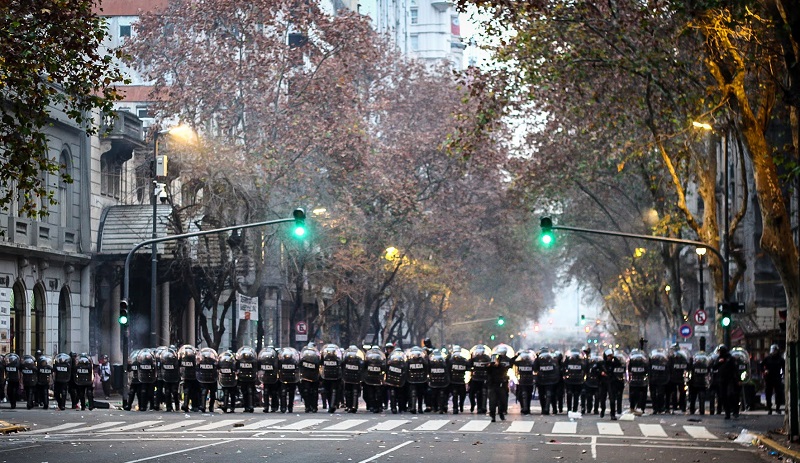
In a 12-page document, the Center for Legal and Social Studies (CELS) detailed the illegal nature of the procedures to arrest those who demonstrated on June 12 against the approval of the package of laws being discussed by the Senate. It requests the judge intervening in the case to review the accusations made against the people deprived of their liberty and, in particular, regarding the request that they be placed in preventive detention. In addition, it requests that the judge immediately order the release of all detainees, many of them transferred to federal prisons while the judicial processing continues.
Among the grounds against the preventive detention issued in this case, the CELS warns “that this request from the Prosecutor has several serious problems. First of all, it does not describe specific, detailed, precise or circumstantiated facts. In this sense, it is not clear what the object of his investigation would be. His accusation is made up, plain and simple, of legal figures and not of specific behaviors” and adds that: “Secondly, the Prosecutor requested that these 35 people be summoned to testify without providing even a minimal assessment of the evidence that allows you to link each of them with the facts (not described in any section of your request). In this way, what he did was to attribute to them, in an indistinct manner, a series of criminal offenses without even constructing in evidence the sufficient degree of suspicion for which he considers that they should be investigated. This evidentiary assessment that leads to the construction of a sufficient degree of suspicion is the most basic foundation when summoning someone to give a statement within the framework of a criminal process such as the one being attempted.”
Later, the CELS maintains that the IACHR has said that: “preventive detention is an exceptional measure and that it is applied only in cases in which there is a reasonable suspicion that the accused may evade justice, hinder the preliminary investigation by intimating witnesses, or destroy evidence.” And, in turn, it has said that “the procedural risk of flight or frustration of the investigation must be based on objective circumstances. The mere allegation without consideration of the specific case does not satisfy this requirement.”
The Inter-American Court of Human Rights (Inter-American Court) has stated that determining preventive detention based on the type of crime being tried is equivalent to “anticipating a penalty to the sentence, which is against universally recognized general principles of law.” He also stated that: “from the provisions of Article 8.2 of the Convention derives the State obligation not to restrict the freedom of the detainee beyond the limits strictly necessary to ensure that it will not impede the efficient development of the investigations and that it will not evade the action of justice, since preventive detention is a precautionary measure, not a punitive one.”
Furthermore, the Inter-American Court has been categorical in highlighting “the need, enshrined in the American Convention, that preventive detention will be justified in the specific case, through a weighing of the elements that occur in it, and that in no case “The application of such precautionary measure is determined by the type of crime for which the individual is charged.” The Inter-American Court has determined that preventive detention is the most severe measure that can be applied to the accused of a crime and that the rule should be the freedom of the accused while his criminal responsibility is resolved. The IACHR, in the same sense, has maintained that “by virtue of the principle of innocence, in the framework of a criminal proceeding, the accused must remain free, as a general rule.”
The IACHR has characterized the principle of exceptionality as the “guiding principle to establish the legality of preventive detention.” […]by virtue of which an attempt is made to prevent preventive detention from becoming the rule and, thus, distorting its purpose.”
The CELS concludes its document that they will send information to international organizations “about the police operation and the criminal proceedings initiated against the 35 people deprived of their liberty, to the Inter-American Commission, and in particular to the Rapporteur for Argentina, the Rapporteur of Human Rights Defenders and Justice Operators, to the Special Rapporteur for Freedom of Expression, to the Special Rapporteur on Economic, Social, Cultural and Environmental Rights (RESECA). In the same sense, we sent information to the Special Rapporteur on the right to freedom of peaceful assembly and of association, to the Special Rapporteur on the situation of human rights defenders and to the Special Rapporteur on the promotion and protection of the right to freedom of opinion and expression of the United Nations.
In this way, CELS joins the complaint being made by human rights organizations that today participated and supported the press conference that was held this Friday afternoon at Serpaj.
Source: www.laizquierdadiario.com

